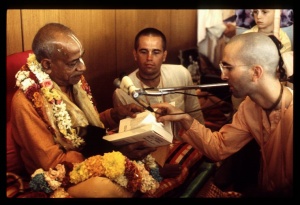SB 10.74.53: Difference between revisions
m (1 revision(s)) |
(Vanibot #0018 edit: make synonym terms in Sanskrit italic in SB - Vanisource) |
||
| Line 1: | Line 1: | ||
{{info | {{info | ||
|speaker= | |speaker=Śukadeva Gosvāmī | ||
|listener=King | |listener=King Parīkṣit | ||
}} | }} | ||
[[Category:Srimad-Bhagavatam - Canto 10 Chapter 74]] | |||
[[Category:Bhagavatam Verses Spoken by Sukadeva Gosvami - Vanisource|107453]] | |||
<div style="float:left">'''[[Srimad-Bhagavatam]] - [[SB 10|Tenth Canto]] - [[SB 10.74: The Deliverance of Sisupala at the Rajasuya Sacrifice|Chapter 74: The Deliverance of Śiśupāla at the Rājasūya Sacrifice]]'''</div> | |||
<div style="float:right">[[File:Go-previous.png|link=SB 10.74.52]] '''[[SB 10.74.52]] - [[SB 10.74.54]]''' [[File:Go-next.png|link=SB 10.74.54]]</div> | |||
{{RandomImage}} | |||
{{SBnotice}} | |||
==== TEXT 53 ==== | ==== TEXT 53 ==== | ||
<div | <div class="verse"> | ||
duryodhanam ṛte pāpaṁ | :duryodhanam ṛte pāpaṁ | ||
kaliṁ kuru-kulāmayam | :kaliṁ kuru-kulāmayam | ||
yo na sehe śrīyaṁ sphītāṁ | :yo na sehe śrīyaṁ sphītāṁ | ||
dṛṣṭvā pāṇḍu-sutasya tām | :dṛṣṭvā pāṇḍu-sutasya tām | ||
</div> | </div> | ||
| Line 17: | Line 22: | ||
==== SYNONYMS ==== | ==== SYNONYMS ==== | ||
<div | <div class="synonyms"> | ||
''duryodhanam''—Duryodhana; ''ṛte''—except; ''pāpam''—sinful; ''kalim''—the empowered expansion of the age of Kali; ''kuru-kula''—of the Kuru dynasty; ''āmayam''—the disease; ''yaḥ''—who; ''na sehe''—could not tolerate; ''śrīyam''—the opulences; ''sphītām''—flourishing; ''dṛṣṭvā''—seeing; ''pāṇḍu-sutasya''—of the son of Pāṇḍu; ''tām''—that. | |||
</div> | </div> | ||
{{SBcollapse}} | |||
==== TRANSLATION ==== | ==== TRANSLATION ==== | ||
<div | <div class="translation"> | ||
[All were satisfied] except sinful Duryodhana, the personification of the age of quarrel and the disease of the Kuru dynasty. He could not bear to see the flourishing opulence of the son of Pāṇḍu. | [All were satisfied] except sinful Duryodhana, the personification of the age of quarrel and the disease of the Kuru dynasty. He could not bear to see the flourishing opulence of the son of Pāṇḍu. | ||
</div> | </div> | ||
| Line 31: | Line 36: | ||
==== PURPORT ==== | ==== PURPORT ==== | ||
<div | <div class="purport"> | ||
Śrīla Prabhupāda writes, "Duryodhana by nature was very envious because of his sinful life, and he appeared in the dynasty of the Kurus as a chronic disease personified in order to destroy the whole family." Śrīla Śrīdhara Svāmī mentions that Duryodhana hated pure religious principles. | Śrīla Prabhupāda writes, "Duryodhana by nature was very envious because of his sinful life, and he appeared in the dynasty of the Kurus as a chronic disease personified in order to destroy the whole family." Śrīla Śrīdhara Svāmī mentions that Duryodhana hated pure religious principles. | ||
</div> | </div> | ||
__NOTOC__ | </div> | ||
</div> | |||
<div style="float:right">[[File:Go-previous.png|link=SB 10.74.52]] '''[[SB 10.74.52]] - [[SB 10.74.54]]''' [[File:Go-next.png|link=SB 10.74.54]]</div> | |||
__NOTOC__ | |||
__NOEDITSECTION__ | |||
Revision as of 18:57, 1 December 2017

A.C. Bhaktivedanta Swami Prabhupada
Please note: The synonyms, translation and purport of this verse were composed by disciples of Śrīla Prabhupāda
TEXT 53
- duryodhanam ṛte pāpaṁ
- kaliṁ kuru-kulāmayam
- yo na sehe śrīyaṁ sphītāṁ
- dṛṣṭvā pāṇḍu-sutasya tām
SYNONYMS
duryodhanam—Duryodhana; ṛte—except; pāpam—sinful; kalim—the empowered expansion of the age of Kali; kuru-kula—of the Kuru dynasty; āmayam—the disease; yaḥ—who; na sehe—could not tolerate; śrīyam—the opulences; sphītām—flourishing; dṛṣṭvā—seeing; pāṇḍu-sutasya—of the son of Pāṇḍu; tām—that.
Translation and purport composed by disciples of Śrīla Prabhupāda
TRANSLATION
[All were satisfied] except sinful Duryodhana, the personification of the age of quarrel and the disease of the Kuru dynasty. He could not bear to see the flourishing opulence of the son of Pāṇḍu.
PURPORT
Śrīla Prabhupāda writes, "Duryodhana by nature was very envious because of his sinful life, and he appeared in the dynasty of the Kurus as a chronic disease personified in order to destroy the whole family." Śrīla Śrīdhara Svāmī mentions that Duryodhana hated pure religious principles.